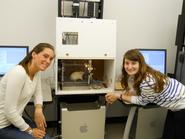
Rats may be notorious for their unappealing image, but in a scientific laboratory they can be instrumental toward testing hypotheses and unlocking new discoveries. In psychology, studying the behavior of rats and other animals such as birds can shed light on otherwise baffling animal phenomena. This summer, psychology major Sarah Cocuzzo ’13 and neuroscience major Megan Lander ’13 will work with Visiting Assistant Professor of Psychology Michael Frederick to study several rats with regard to the phenomenon of contrafreeloading. Their project will examine the tendency toward working for a reward even when it is readily available without any effort.
Within a few days, rats can be trained to perform some kind of work for a reward, such as pressing a bar for water. Because this is the only source of water available to them in their cage, the rats learn the behavior well and become adept at performing that specific task. Because pressing the lever represents work, one might predict that the rats would abandon this behavior if presented with a readily-available, “free” water source, a source for which they don't have to work.
However, studies have found that rats frequently continue to press the bar for water in addition to drinking from the free source. This behavior has been termed contrafreeloading, and the reasons behind it are debated among scientists. On one hand, the rats may have simply gotten into the routine of working for food, but on the other they may exhibit exploratory behavior, in which they continue to explore their environment out of more than simple routine.
Lander, Cocuzzo and Frederick will observe contrafreeloading by first training a few rats to push a bar for water, and then introducing a free water source. In addition to observing the rats’ behavior in the presence of free water, some rats will be treated with a dopamine-raising drug, Quinpirole, which has been shown to increase contrafreeloading tendencies. Some researchers have suggested that the drug merely makes the rats hyperactive, in which case they will press the lever without any purpose.
To test for this possibility, the group will remove the water that would have been a reward for bar pressing, and if the drug-treated rats continue to press the bars, their behavior indicates hyperactivity. Ultimately, the team hopes to find support for the exploratory explanation of contrafreeloading in rats. Cocuzzo, who is interested in evolutionary psychology, relates that exploratory behavior may have evolutionary ties because exploring the environment could help the rats survive harsh conditions.
Both students look forward to seeing the results of their study. For Lander, it is easy to become caught up in the details of a study, but seeing the final results reveals the larger picture of their efforts. Cocuzzo, on the other hand, is very interested in watching the study unfold, especially when free water is introduced to the trained rats. In her free time, Cocuzzo enjoys photography and she is part of the student organization ELS. Lander’s interests outside the laboratory include dance, and she is part of the Hamilton dance team. The students and Professor Frederick will explore contrafreeloading to further their understanding of this fascinating and unexpected phenomenon.
Cocuzzo is a graduate of Needham High School (Mass.) Lander is a graduate of Deerfield Academy (Mass.)
Posted June 3, 2011
